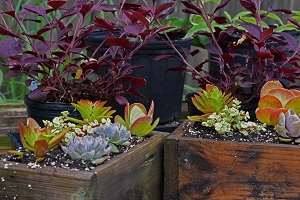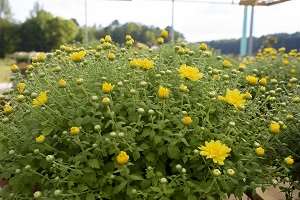By Ms. Linda M. Breazeale
Increasing markets for local foods and succulent plants are encouraging green industry suppliers to offer new products for horticulture customers.

Horticultural crops are important to Mississippi's agricultural economy. In 2015, out of the state's 16 commodities, horticultural specialty crops ranked No. 9 with an estimated farm-gate value of $112 million. That value placed it ahead of hay, hogs, sweet potatoes, grain sorghum, dairy, wheat and peanuts. Horticultural crops include fruits, vegetables, tree nuts, turfgrass and products grown for ornamental uses, also known as the green industry.

Geoff Denny, horticulture specialist with the Mississippi State University Extension Service, said 2016 sales have been typical of election years, which tend to see decreased new construction and related plant demands.
“Sales of woody plants, shrubbery and trees are down, but we are seeing a growing interest in edibles and succulents,” Denny said. “People want to know where their food came from and what, if any, chemicals were used in its production. The best way to do that is to grow your own.”
All types of gardening -- from traditional home gardens to raised beds to patio planters --are attracting new growers.
“Succulents for decoration are a new crop for the horticulture industry that are selling well. Social media and apps like Pinterest are inspiring beginners to start growing plants,” he said. “Dish gardens or living decorations tend to be easy to grow and are ideal for people without much experience with plants.”
Denny said interest in succulents will not be a passing fad.
“As availability improves, prices should come down, and diversity of plants will go up,” he said.
Gary Bachman, MSU Extension Service horticulture specialist and host of Southern Gardening, said succulents don’t need much water and are versatile and basically carefree.
“Succulents are plants with soft, juicy leaves and stems. There are hundreds of succulents available in a wide array of colors and textures,” Bachman said. “They make good choices for low-water-use gardening. Growth habits include everything from ground-hugging creepers to upright growers.”
Denny said a new program of the Mississippi Nursery and Landscape Association is targeting homeowners who battle deer for a beautiful yard.
“Unfortunately, the expansion of the deer population is making it harder for people to find plants that will remain in their landscape over time,” he said. “Customers are less likely to spend money on plants if deer are removing them overnight.”
Denny said that while deer will eat anything if hungry enough, Extension has helped develop a list of plants they are more likely to ignore. The “Deer Proof Plants” list is available on the nursery and landscape association’s website at http://msnla.org/msnla/deer-proof-plants/.
Mississippi Nursery and Landscape Association President Rudolph Hall of Lucedale said he hopes the list will inspire home gardeners who have become frustrated in the battle with wildlife.
Hall said the industry’s two busiest times of year are spring and fall.
“We had a good spring, but this fall has been slow,” he said. “Regional shows around the Southeast revealed optimistic attitudes. Everyone will know more about what to expect in 2017 after the election is over.”
Source: msstate.edu